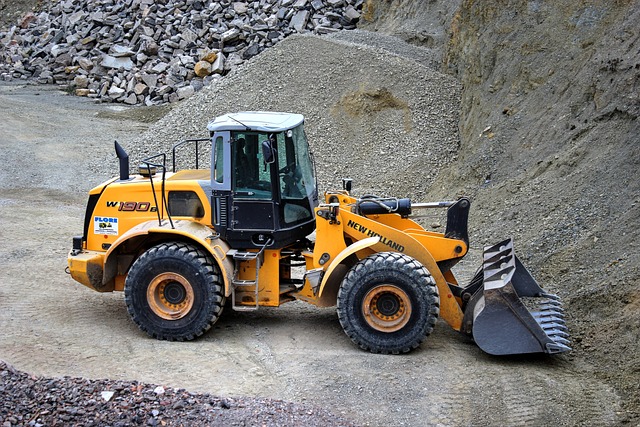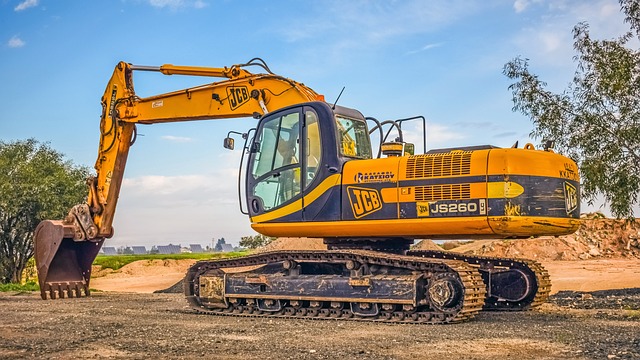Functions of Wheel Loaders in Various Industries

Wheel loaders are heavy equipment that use wheels as their drive, not tracks or chains like other heavy equipment, such as bulldozers. With this system, wheel loaders offer higher mobility and better speed compared to heavy equipment that uses tracks. Rubber wheels allow this tool to work on various types of terrain, including paved roads or hard surfaces.
Wheel loaders have a bucket on the front that can be lifted and tilted. This bucket is usually used to load, transport, or move materials to a transport truck or a specific area.
Main Functions of Wheel Loader
Loading Materials
The main function of a wheel loader is to load materials into a transport truck or container. The materials loaded can be soil, sand, rocks, or other materials. With a large bucket capacity, wheel loaders are able to complete this task efficiently, especially on a large project scale.Transporting Materials Short Distances
Wheel loaders are also often used to transport materials short distances, such as from one point to another on a project site. This is very helpful in moving materials quickly without the need for additional equipment.Clearing the Work Area
In construction projects, wheel loaders are often used to clear work areas of debris or obstructing materials. With its power and agility, this tool can level the ground or clear an area quickly.Leveling the Land
In addition to loading materials, wheel loaders can also be used to level the land. This is done by using a bucket to press or shift the soil to the desired location.Mixing Materials
In some projects, wheel loaders are also used to mix materials, such as sand and cement. By swinging its bucket, the wheel loader can help create a homogeneous mixture for construction needs.
Wheel Loader Applications in Various Industries
Construction
In the construction sector, wheel loaders are a very important heavy equipment. From loading construction materials such as sand, stone, and concrete to leveling the land at the project site, this tool is the backbone in completing the work efficiently.Mining
In the mining industry, wheel loaders are used to load materials such as ore, coal, or other minerals into mining trucks. With their large bucket capacity, wheel loaders are able to handle high volumes of material, speeding up the production process.Agribusiness
Wheel loaders are also used in the agribusiness sector to move crops, fertilizers, or other organic materials. With its flexibility and maneuverability, this tool is very suitable for use in large agricultural areas.Manufacturing and Heavy Industry
In manufacturing and heavy industry, wheel loaders are used to move raw materials or semi-finished products from one area to another. Their ability to work in harsh terrain makes them ideal for demanding industrial environments.Waste Management and Recycling
In waste management, wheel loaders are used to move waste to processing facilities or separate recyclable materials. This tool helps increase efficiency in the waste management process.
Wheel Loader Advantages
High Mobility
With rubber wheels, wheel loaders are able to move quickly on hard or soft terrain. This makes them more efficient than other heavy equipment that uses tracks.Flexibility of Use
Wheel loaders can be used for a variety of tasks, from loading, moving, to leveling materials. This makes them a versatile tool in a variety of industrial applications.Time Efficiency
Large bucket capacity allows wheel loaders to complete jobs faster, saving operational time.Ease of Operation
Most wheel loaders are designed with easy-to-use control systems, so operators can operate them more comfortably and efficiently.Relatively Easy Maintenance
Compared to other heavy equipment, wheel loader maintenance tends to be simpler because its systems are more easily accessible.
Factors to Consider in Using Wheel Loaders
Size and Capacity
Choose a wheel loader with a size and capacity that suits the needs of the project. For example, large projects require a wheel loader with a larger bucket.Terrain Conditions
Make sure the wheel loader used is suitable for the terrain conditions. For muddy or slippery terrain, another heavy equipment equipped with tracks may be needed.Fuel Efficiency
A fuel efficient wheel loader will reduce operating costs in the long run.Operational Safety
Ensure the wheel loader is equipped with adequate safety features, such as lights, horns and a good braking system.
Conclusion
Wheel loaders are very important heavy equipment in various industrial sectors. Their main functions, such as loading, transporting, leveling, and cleaning materials, make them versatile and efficient tools. The proper use of wheel loaders can increase productivity, reduce processing time, and reduce operational costs.
By considering factors such as size, capacity, and terrain conditions, wheel loaders can be optimally utilized to meet project needs. Their flexibility, mobility, and efficiency make them one of the best investments in the world of construction and heavy industry.
Technology Development in Wheel Loaders
As time goes by, technology in wheel loaders continues to innovate to improve efficiency, safety, and operator comfort. Here are some technological developments that have been applied to this heavy equipment:
Advanced Hydraulic System
Modern hydraulic technology enables the wheel loader bucket and arm to operate with high precision. This system provides greater lifting power and better control, even for heavy loads.Fuel-Saving Technologies
Many of today's wheel loaders are equipped with more efficient and environmentally friendly engines. Technologies such as auto-idle and engine shutdown helpSystem Automatic
BabyErgonomic Cab
Operator comfort is a major concern in the design of modern wheel loaders. The cab, equipped with intuitive controls, ergonomic seating and air conditioning system, provides maximum comfort during machine operation.Navigation System and GPS
InIoT Integration and Remote Monitoring
Wheel loader mod
Challenges in Using Wheel Loaders
M
Extreme Terrain Conditions
Muddy, slippery, or rocky terrain can limit the mobility and efficiency of a wheel loader. For these conditions, adaptation or the use of additional heavy equipment is required.Operational Costs
Although more economicalAccident Risks
The use of heavy equipment always carries the risk of accidents. Therefore, operators must be well trained and always comply with safety protocols.Increasing Energy Demand
Large projects often require large capacity wheel loaders, which automatically require more fuel. Innovation in environmentally friendly engines is an important solution to meet this challenge.
Tips to Maximize the Use of Wheel Loaders
To get the most out of a wheel loader, here are some tips you can apply:
Choose the Right Tool for Your Needs
Every project has different needs. Choose a wheel loader with the capacity and features appropriate for the job at hand.Perform Routine Maintenance
Routine maintenance is key to keeping your wheel loader in tip-top condition. Make sure all components, especially the engine and hydraulic system, are checked regularly.Train Operators Professionally
Well-trained operators are able to operate wheel loaders more efficiently and safely. Make sure operators understand how the machine works and the safety protocols to follow.Take Advantage of Modern Technology
If possible, use a wheel loader that is equipped with the latest technological features. This will help increase efficiency and reduce operational costs.Optimize Fuel Usage
Avoid operating the wheel loader in an idle state for too long to save fuel. Also, use quality fuel to maintain engine performance.
Conclusion
Wheel loaders are irreplaceable heavy equipment in various industrial sectors. Their main functions, which include loading, transporting, and cleaning materials, make this tool very important in construction projects, mining, agribusiness, and other sectors.
Modern technology has increased the efficiency and capabilities of wheel loaders, making them an increasingly reliable tool to meet the needs of today's industry. With proper maintenance, trained operators, and proper equipment selection, wheel loaders can be a very valuable investment for a company.
However, challenges such as operational costs and accident risks must always be considered to ensure their safe and efficient use. With the right approach, wheel loaders can not only be functional machines, but also contribute greatly to project success and overall operational efficiency.



